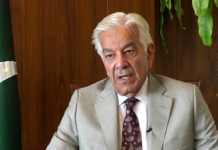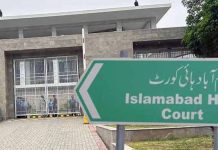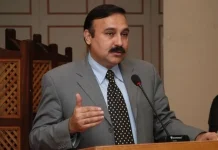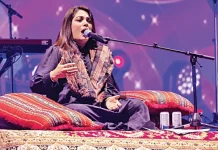Karachi: In a groundbreaking meeting, the Pakistan Federal Union of Journalists (PFUJ), in collaboration with the International Federation of Journalists (IFJ) and Working Women Welfare Trust, presented findings from the Provincial Research and Lobbying Project aimed at improving the working conditions of Sindh journalists. Key stakeholders, including government representatives, political figures, and media unions, convened to discuss prevalent issues such as low wages, inadequate facilities, and safety concerns. Representatives from political parties, civil society, and women’s organizations shared insights and initiatives.
The event featured a comprehensive presentation by IFJ Focal Person and Trainer Sheher Bano, revealing the outcomes of the first-ever survey on decent work conducted in seven districts of Sindh. The survey highlighted challenges such as delayed salaries, lack of medical facilities, and a decline in journalism, leading to the closure of numerous newspapers and channels.
President PFUJ G.M. Jamali addressed the meeting, emphasizing the importance of unity among journalists, awareness of labor laws, and the safety of journalists. He advocated for legislative support, especially regarding improved union registrations, calling for the creation of laws and a dedicated agency.
The meeting also received a voice message from PID’s Director General, Erum Tanveer, outlining active efforts in capacity building and ensuring journalists’ rights. Representatives from political parties, civil society, and women’s organizations contributed insights, emphasizing the importance of united efforts.
Mehnaz Rahman from the Aurat Foundation highlighted that as long as united efforts are not made, journalists will continue to be exploited and weakened. President Working Women Trust, Rehana Afroz, stated that there is a need for unity among journalists. She emphasized that unless this is achieved, things cannot improve. Shama Meethani from the Pakistan People’s Party mentioned that their government had passed the Protection of Journalists law among other laws, and they continue to work on its implementation. Zahida Bhund from the Pakistan Muslim League (N) acknowledged the significant role women have played, particularly saluting the role women are currently playing in journalism. Shameem Mumtaz suggested a departure from sensationalized breaking news, citing its negative impact on journalists’ confidence. She emphasized the need for unity among journalists. Secretary Working Women Welfare Trust, Humaira Quraishi, proposed that educational institutions, especially the Media Science department, should play a role in educating media students about media ethics and laws. IFJ Country Coordinator Ghulam Mustafa and General Coordinator Lubna Jerar Naqvi also expressed their views during the meeting. Independent candidate Suroor Zafar participated, along with senior journalist Ghazala Fasih.
The meeting was of the view that the diverse perspectives shared by political party representatives, IFJ coordinators, and independent candidates, promising to address journalists’ concerns in their manifestos, suggests a potential for sustained impact beyond the immediate event. Overall, the project has created a platform for collaboration and advocacy, with the potential to instigate positive changes in the working conditions of journalists in Sindh and possibly serve as a model for broader initiatives across the country.
The meeting concluded with a unanimous resolution, symbolizing a collective commitment to unity, intensified efforts, and a shared voice in addressing the challenges faced by journalists in Pakistan.























